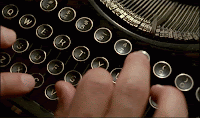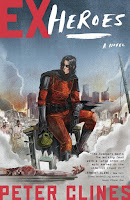Okay, look… there’s a good chance this post will piss you off.
Two things I ask you to keep in mind, going in.
First is that this comes from a place of kindness. If you’re reading this, I want you to succeed. All of you. Well, okay, not him, but the rest of you, absolutely. So I’m saying these things because… well, they need to be said. And you need to hear them.
Some of you really need to hear them.
Second is that everything I’m going to be talking about is something I’ve personally experienced.
Not that I’ve seen another writer doing it—
I’ve done it.
I’ve believed it.
I’ve been the person needing that smack in the face.
And I learned from it. And got better because of it.
Writing’s tough. It’s hard work. I know this, because I’ve been doing it for a living for over a decade now.
When someone tells me how easy and wonderful and fun writing is, I’m often tempted to point out…
Well, look. There was a point when I thought writing was easy and fun. It was back when I wasn’t taking it seriously.
My writing ability started making huge leaps when I was finally able to admit a few things to myself. I think that’s true of most people in most fields—if we can’t be honest about where we are, it’s hard to improve.
That being said…
My first attempts at writing will suck—This sounds harsh, yeah, but… well…
Too often when we’re starting out, we just can’t get past the idea that something we wrote isn’t good.
I know I couldn’t.
My work was typed.
It was a full page long!
My mom liked it!
Of course it deserved to sell.
It deserved awards!
International awards!
Seriously, there was soooooo much writing before my “first novel.” There was Lizard Men from the Center of the Earth (two different versions). A trope-filled sci-fi novel. Some Boba Fett and Doctor Who fan fic. A fantasy novel fuelled by a sudden influx of hormones during my teen years (enough said about that). The Werewolf Detective of Newbury Street, The Trinity, The Suffering Map, about half of a novel called Mouth.
And then…Ex-Heroes.
It’s just against human nature to spend hours on something and then tell yourself you just wasted a bunch of time. Why would I write something I couldn’t sell? Obviously I wouldn’t, so my latest project must deserve a six-figure advance.
The problem here is the learning curve.
None of us like to be the inexperienced rookie, but the fact is it’s
where everyone starts.
Surgeons, chefs, pilots, astronomers, mechanics… and writers.
Oh, there are a few gifted amateurs out there, yeah—
very, very few—but the vast majority of us have to work at something to get good at it.
And we can’t improve until we accept that we need improvement.
My first draft is going to suck—There was a point where I’d fret over my first draft. I’d spend hours laboring over individual words, each sentence, every paragraph. I’d get halfway down the page and then go back to try to fix things. It meant my productivity was slowed to a crawl because I kept worrying about what had happened in my story instead of what was going to happen.
The freeing moment was when I realized my first draft was always going to suck.
Always.
And that’s okay.
Everyone’s first draft sucks.
Everybody has to go back and rework stuff.
It’s the nature of the beast.
With those expectations gone, it became much easier for me to finish a first draft, which is essential if I ever wanted to get to a second draft. And a third draft. And maybe even a sale.
No, needing another draft doesn’t make me a lesser writer in any way.
Every single professional writer I know (and I know a lot of them at this point) does a second draft.
And usually a third and fourth.
My writing needs editing. Lots of editing—As I mentioned, I’ve been doing this for a while. Surely by now I’ve hit the point where my stuff rolls onto the page (or screen) pretty much ready to go, yes? I mean, at this point I must qualify as a good writer and I don’t need to obsess so much over those beginner-things, right?
Alas, no. Like I just said, my first draft is going to need work. We all make the easy first choice now and then. Things slip past us. We misjudge how some things are going to be read. I’m fortunate to have a circle of friends and a really good editor at my publisher who all call me out when I make these mistakes or just take the easy route when I’m capable of doing something better.
As I mentioned above, part of this is the ability to accept these notes and criticisms.
I’m not saying they’re all going to be right (and I’ve been given a few really idiotic notes over the years), but if my default position is that any criticism is wrong then my work is never going to improve past the first draft.
Which, as I mentioned above, sucks.
My writing needs cuts—Sticking to the theme, if I believe my writing is perfect, it stands to reason
all of it is perfect.
It’s not 90% perfect with those two odd blocks that should be cut.
When I first started to edit, one of my big problems was that
everythingneeded to be there.
It was all part of the story.
Each
subplot, every
action detail and character moment, all of the
clever references and in-jokes.
The Suffering Map was where I first started to realize things needed to be cut. I’d overwritten—which is fine in a first draft as long as I can admit it in later drafts. I had too many characters, too much detail, subplots that had grown too big, character arcs that became too complex. It took a while, but I made huge cuts to the book. It had to be done. Heck, I just cut a whole subplot from the book I’m editing right now. About 2500 words gone, snip-snip, in about five minutes.
And the book it better for it.
My writing is going to be rejected –Know what I’ve got that most of you reading this will never have? Rejection letters. Paper letters that were mailed to me by editors. I’ve got dozens of them. Heck, I’ve probably got a dozen from Marvel Comics alone. And since then I’ve got them from magazines, big publishers, journals, magazines, ezines…

But when that first rejection from Marvel came… I was crushed.
Devastated.
How could they not like my story?
It was a full page!
I included a colored pencil rendering of what the cover should look like.
Did I mention it was typed?!
It took me weeks—whole weeks, plural—to work up my courage to try again, and then they shot that one down, too.
Granted, I was eleven, and those stories were awful. I mean… really awful.
Rejection is part of the process. I still get rejections today. I expect I’ll be getting then for the foreseeable future.
Which is a good time to mention…
Rejection does not automatically mean my writing is bad—Getting that email is tough, like a punch to the gut. It’s easy to let it get under the skin and fester. Self-doubt feeds on rejections, so it’s important to think of it as “still looking for the right home.”
Like I said, I’m still getting rejections today, even with the fairly solid list of credits and accolades after my name. Editors and publishers are people too, and nothing is going to appeal to everyone. Getting rejected became a lot easier for me when I realized it didn’t show up on my permanent record and it wasn’t a personal attack It was just a person who didn’t connect with that particular story for some reason.
Now, there’s a flipside worth mentioning here…
Rejection also doesn’t automatically mean my writing is good—There’s a lot of
memes and recurring stories and a few general mindsets that push the idea that if my work gets rejected by an agent or editor it
mustbe good, because all those people are idiots. And it can be a comforting thought.
It’s also kinda close to conspiracy-theory reasoning, if you think about it.
Going right back to the beginning of this little rant, there’s a decent chance my work just isn’t good. No big deal. Like I said, I had dozens and dozens of rejections before I started to get some sales.
But if I refuse to back away from the idea that it might be me—if I take dozens of rejections as proof the system is stupid rather than admit the possibility my manuscript wasn’t ready to go out—then I’m never going to improve.
And that’s not going to help me get anywhere.
Speaking of getting anywhere, if you’re in the
Atlantaarea I’m at
Dragon Con this weekend.
Come find me and we can talk about books and writing and is Clark Gregg coming back to
Agents of SHIELD or what?
Next time, I’d like to put a few things in context.
Until then, go write.










